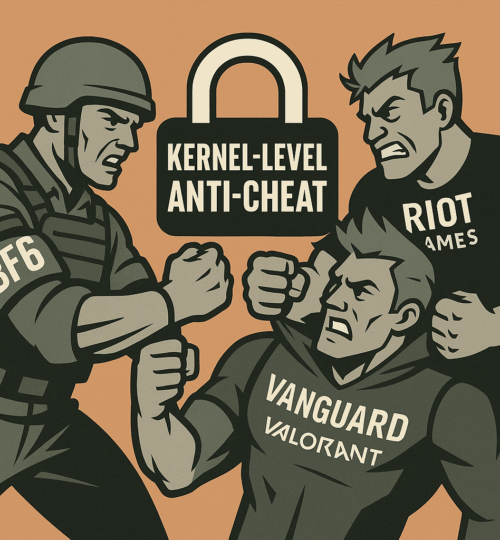The first Battlefield 6 beta gave players a taste of what might be the most important entry in the series in years. Explosions, tanks, skyscrapers, chaos, all the Battlefield hallmarks were there. But lurking under the hood was something less flashy and a lot more divisive: EA’s new kernel-level anti-cheat system.
For most players, it worked invisibly, fire up the beta, hop into a match, and you’re off. But for others? Not so smooth. If you already had Riot’s Valorant installed, or any other game with its own kernel-level anti-cheat, you might’ve found yourself locked out, staring at an error screen, or worst case: uninstalling one game just to play the other. And that, my friends, is where things start to get messy.
Kernel-Level Anti-Cheat 101 (Without the Boring Lecture)
Think of your PC like a nightclub. Regular apps, browsers, Discord, Steam, hang out on the dance floor. They can see each other, bump shoulders, and sometimes get into scuffles.
Now, the kernel is like the bouncer with the keys to the whole place, the basement, the roof, even the vault with the expensive whiskey. It has unrestricted access.
A kernel-level anti-cheat basically gives a game its own personal bouncer at the deepest level of your PC. It:
- Scans everything: sees all running programs and memory in real time.
- Shuts down trouble early: blocks cheats before they can even slip onto the dance floor.
- Can’t be shoved aside: a normal cheat running in “user mode” has no chance against it.
- Sounds great, right? Until every game publisher decides they need their own bouncer, and none of these guys trust each other.
The Battlefield vs. Valorant Problem
 If you had Valorant installed during the first Battlefield 6 beta, chances are you ran into Riot Vanguard, Riot’s kernel-level anti-cheat. Vanguard doesn’t just sit quietly; it boots up with Windows and hangs around in the background like that roommate who never leaves the couch.
If you had Valorant installed during the first Battlefield 6 beta, chances are you ran into Riot Vanguard, Riot’s kernel-level anti-cheat. Vanguard doesn’t just sit quietly; it boots up with Windows and hangs around in the background like that roommate who never leaves the couch.
So when Battlefield 6 launched with its own anti-cheat, guess what? Two bouncers with equal power don’t play nice together. Either they treat each other like intruders (blocking the game from even starting), or your system just chokes trying to juggle both.
For a lot of players, the only fix was brutal: uninstall Valorant. Big downloads, reconfiguring settings, re-logins, all just to play a beta that lasted a weekend.
The Bigger Picture: An Anti-Cheat Arms Race
Battlefield 6 vs. Valorant isn’t just a one-off. It’s part of a trend. Call of Duty, PUBG, Apex, Fortnite, everybody’s chasing kernel-level anti-cheat because cheats have gotten smarter. Wallhacks and aimbots don’t just run like simple apps anymore; some hide inside the OS itself. To catch them, game devs need to go lower.
The problem? No shared standard. Every company builds their own system, tuned only to protect their game. They don’t handshake with each other, they don’t compare notes, and they certainly don’t trust each other’s drivers.
That means:
- You could end up uninstalling games just to switch between them.
- Crashes and system errors become more likely with multiple drivers fighting for attention.
- Security concerns multiply, more kernel drivers = more potential vulnerabilities.
And it’s not like uninstalling/reinstalling giant games in 2025 is quick. We’re talking 100GB+ downloads, patches, shaders, configs, not exactly “jump in and play.”
Why Devs Say They Need Kernel-Level
 Game studios aren’t being evil overlords for fun. They’ve got good reasons:
Game studios aren’t being evil overlords for fun. They’ve got good reasons:
Cheaters adapt fast: once user-level anti-cheat was figured out, hacks started loading kernel drivers to stay hidden.
It’s a money thing: unchecked cheating can kill a competitive game’s reputation, and when players leave, so does revenue.
Player trust: ironically, devs use “strong anti-cheat” as a selling point to prove they care about fairness.
So the move makes sense, but if every major shooter goes this route, players are the ones caught in the crossfire.
Privacy, Trust, and Blue Screens
Let’s not sugarcoat it: kernel-level anti-cheat is powerful. That means:
- If it has a bug, it can crash your whole system.
- If it has a vulnerability, hackers could use it against you.
- If you don’t trust the developer, you’re letting them watch system-level activity.
Riot Vanguard got pushback at launch for this exact reason. People didn’t love giving Riot, a company owned by Tencent, that much access. Battlefield’s system hasn’t been as controversial (yet), but the concerns are universal.
Where This Could Go
If the industry keeps marching this way, we’re staring at a fork in the road. Fragmented nightmare, players constantly uninstalling games, swapping drivers, and troubleshooting conflicts OR a shared framework, maybe an industry-standard anti-cheat bouncer that multiple games can trust. The second option sounds dreamy, but game publishers aren’t exactly known for working together unless forced. So for now, players are stuck managing the chaos themselves.
Tips for Players (a.k.a. Sanity Savers)
Check official support: EA and Riot both keep docs on known conflicts.
Try disabling first: some anti-cheats let you shut them down temporarily, though Battlefield may still refuse to run.
Uninstall if you must: betas are short; ripping out Valorant for a weekend may be the path of least resistance.
Keep backups: save installers and configs so reinstalling isn’t as painful later.
Conclusion: The Cost of Fair Play
The first Battlefield 6 beta showed a game with enormous potential, explosive combat, sharp gunplay, and a community hungry for more. But it also highlighted a growing industry problem. The war on cheaters is spilling into a war on player convenience.
Kernel-level anti-cheat is powerful, but if every dev demands the keys to your PC’s basement, players are going to hit walls. Whether it’s Valorant blocking Battlefield, or another title clashing with both, the future looks crowded with bouncers.
For now, the choice may come down to loyalty: which game do you love enough to keep installed, and which one gets the boot?
Because in 2025, the real enemy might not be the other team, it might be your own game library fighting itself.


